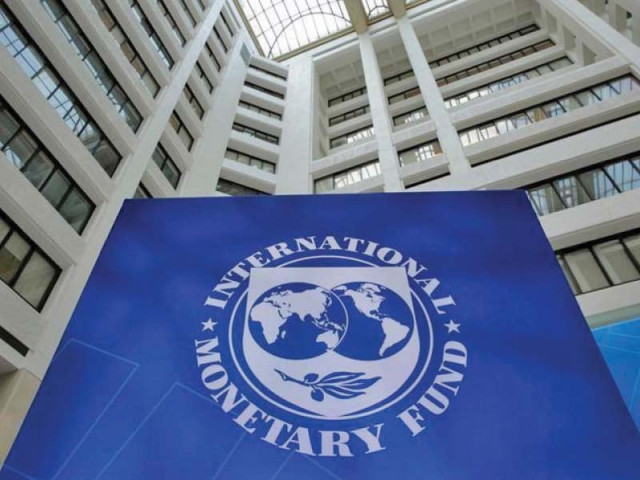Pakistan, IMF begin post-programme monitoring talks
Govt owes $6.1b which has to be repaid over six years, starting from 2018

We anticipate that the IMF will once again push the case for devaluation of Pakistani rupee against the US dollar to curb external sector challenges, said sources in the Ministry of Finance. PHOTO: REUTERS
The talks would continue for about 10 days in which the global lender would highlight risks to the country’s medium-term economic viability and give advice on avoiding looming dangers to make sure that Islamabad repays its debt.
The IMF’s Washington-based Mission Chief Harald Finger is leading the talks. It is expected to be Finger’s last visit to Pakistan. Along with IMF Resident Representative to Pakistan Tokhir Mirzoev, Finger will be completing his current tenure in a few months.
IMF says Pakistan’s hard-won economic stability at stake
After retirement of Masood Ahmad, who was director Central and West Asia Department of the IMF, there is no sympathetic voice in Washington left that could plead Islamabad’s case. Due to its political compulsions, the government has also left the post of Senior Advisor to the IMF Executive Director vacant for the last ten months. The government has been using these foreign posts to accommodate favourite District Management Group’s bureaucrats for the last four years, which has adversely affected the country’s position in these important financial institutions.
As of June 2017, Pakistan owed $6.109 billion to the IMF which it has to repay over six years, starting from 2018. The repayments will peak in 2021 when Pakistan will return over $1 billion.
The Post Programme Monitoring (PPM) is an important part of the Fund’s safeguards’ architecture focusing on members with significant outstanding Fund credit or heightened vulnerabilities that are no longer in a programme relationship with the Fund, according to the IMF’s PPM guidelines.
The PPM’s goal is to identify risks to medium-term viability, provide early warnings on risks to the Fund’s balance sheets, and deliver advice that will assist the member country to repay the Fund.
After the end of the $6.2 billion IMF programme in September last year, Pakistan’s external account has deteriorated at a rapid pace, exposing the hollowness of reforms under the three-year IMF programme. The current account deficit has already widened to over $5 billion during the first four months of this fiscal, which is more than double the previous year’s level.
The State Bank of Pakistan’s (SBP) official foreign currency reserves slid to $13.54 billion -down by $5 billion since the expiry of the IMF programme. The central bank used a significant chunk of $5 billion in defending the overvalued Pak rupee on advice of the federal government, said sources in the SBP. They said that this will be one of the contentious issues between Pakistan and the IMF during the ten-day long talks. The rapid deterioration of the external account has also put the current IMF team in an awkward position, as the same team was giving good health reports to IMF’s top management hardly over a year ago.
“Pakistan has sufficient buffers to absorb medium-sized economic shocks because of the three-year stabilisation programme” Tokhir Mirzoev had said in August last year.
But due to rapid deterioration of the external account, the government rushed to global capital markets and raised $2.5 billion by floating two sovereign bonds last week. The $2.5 billion are expected to be transferred in the next couple of days.
IMF data bloats Pakistan forex reserves by $3bn
“Doing nothing and merely placing faith in half-hearted policy measures supplemented by more borrowing to stave off these pressures would be unsustainable and the recent flotation of bonds has bought us only a few months,” wrote Shahid Kardar, former SBP governor in an article for Dawn on Tuesday.
He further stated that for a new bailout package the IMF is unlikely to talk to a government with a remaining life of seven to eight months or the caretaker setup, especially when big moves supposedly have to be made to tackle the problem.
We anticipate that the IMF will once again push the case for devaluation of Pakistani rupee against the US dollar to curb external sector challenges, said sources in the Ministry of Finance. In its Article-IV report that the IMF gave in July this year, the IMF stressed that reversing the recent decline in foreign exchange reserves and allowing for greater exchange rate flexibility are needed to rebuild external buffers, which are below adequate levels.
It said that Pakistan’s real effective exchange rate is overvalued by almost 10% to 20 % and sought “greater exchange rate flexibility, fiscal adjustment, and structural reforms” to correct the imbalance.
The sources said that other sensitive issue in the eyes of the IMF will be massive fiscal slippages in the last fiscal year as well as in the first quarter of this fiscal. In its Article-IV report the IMF advised Pakistan to ensure stronger consolidation in fiscal year 2017-18 than planned in the budget, which means levying more taxes.
On the structural front, progress in energy sector reforms would be discussed, as the power sector is again heavily bleeding with total circular debt touching Rs800 billion.
Published in The Express Tribune, December 6th, 2017.
Like Business on Facebook, follow @TribuneBiz on Twitter to stay informed and join in the conversation.


















COMMENTS
Comments are moderated and generally will be posted if they are on-topic and not abusive.
For more information, please see our Comments FAQ